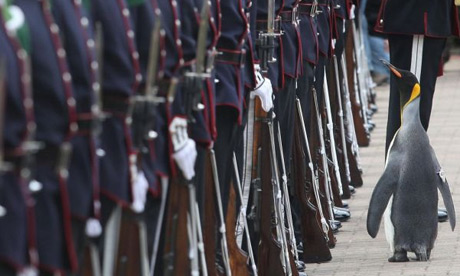Earlier this week, I wondered if we might soon see European personnel under Russian command in Georgia to help keep (well, keep an eye on) the peace. But Europeans are flexible about this sort of thing. In this hour of crisis, it’s good see that the Norwegian military was able to deploy thirty soldiers to Edinburgh zoo for the knighting of a penguin. This bird is Colonel-in-Chief of the Norwegian army. Frankly, if I were Nils the Penguin, I’d be looking to get a discharge: given the difficulties most European armies have sending actual troops overseas, I’d be worried that I might get my waddling orders for Gori at a moment’s notice.
Comparing this – OK, fun – scene with the Russians in Georgia, and noting the latter’s strange decision to go into battle without even a War Puffin as back-up, I was drawn back to the recurrent theme of what Europeans think their troops are for. I’ve only dabbled with the subject, but recalled Daniel’s post in May about the disappearance of martial virtues in Europe. He took Britain as his case-study:
General Richard Dannat, the head of the British army, once remarked that the British Armed Forces are less understood and less honoured for their commitment and sacrifice by ordinary Britons than in comparable societies, like the U.S., and less than in earlier periods.
But this is not unique to Britain. And it is part of two broader inter-related trends: the disappearance of sacrifice as an element of Europe’s development and the divorce of the institution most known for sacrifice – the military – from European society.
And, in the meantime, we increasingly turn to military culture for entertainment, and then are shocked and befuddled when the troops have to go off to war – or other, less postmodern, powers like Russia opt to fight. I’d say more on the subject, but as I’m sat in a cafe in Brooklyn redrafting a pamphlet, I’m slightly conscious that my pondering martial virtues may ring a little a hollow…




